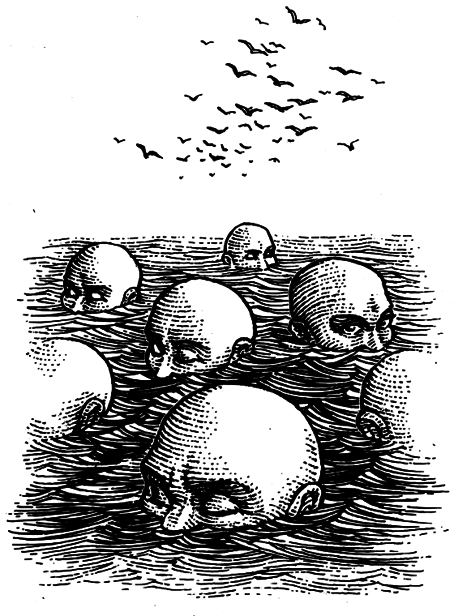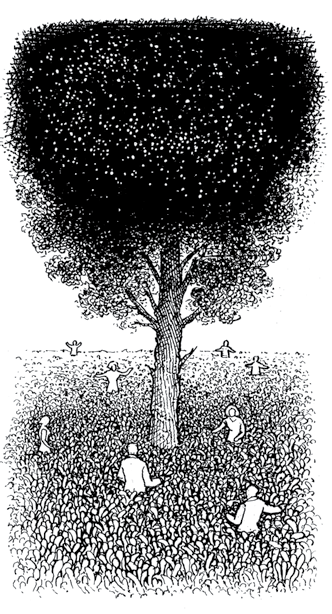A Field Guide to Lucid Dreaming (39 page)
Read A Field Guide to Lucid Dreaming Online
Authors: Dylan Tuccillo,Jared Zeizel,Thomas Peisel

change, we emerged as
homo sapiens sapiens,
Latin for “man wise
wise,” or, as author Michael Mahoney muses, “he who knows he
=
253
<
knows.” We were human beings, equipped with an enlarged per-
spective and an internal world.
Grab hold of your hats, we may be on the brink of another evo-
lutionary leap. Like that paradigm shift so long ago, this change
would not be a physical one. We won’t grow a new tail or learn how
to spit venom out of our mouths.
What if today’s change is an internal one as well? What if we
are awakening, only this time within the internal landscapes of our
minds?
In the average dream, we walk around without any capacity for
self-reflection. We interact with the dream as if it’s real life. While
our waking minds have evolved for thousands of years, it’s as if our
dreaming brain is still stuck on autopilot, void of the same cogni-
tive abilities we possess during our waking hours. What if lucid
dreaming is the beginning of another evolutionary development?
The emergence of a new capacity for self-awareness?
So far this field guide has focused on YOU: your adventure,
your problems. Don’t get us wrong, you’re great, you really are.
But let’s pull back the camera and take a look at the bigger picture.
What would it look like if this ability wasn’t just a hobby, but
a cornerstone of our societies? Could lucid dreaming change the
world?
=
254
<
Projecting into the Future
In the history of the collective as in the history of the individual,
everything depends on the development of consciousness.
—Carl Jung
protégé of Freud, example of student becoming the master
<•=
As soon as our ancestors began to think about thinking, other
things began to emerge that we now take for granted: imagi-
nation, forethought, curiosity, complex logic, reason, etc. With
our new ability to self-reflect in the dream, we too could find
ourselves with capacities previously unavailable to us. The world
might drastically change if we simply began valuing our dreams as
a real and transformative tool of experience.
Guidance
In the future, lucid dreaming could be an internal compass helping
us to seek out answers to questions, both personal and collective.
As in many cultures before us, the average person would be in
touch with their dreams. Daily dream interpretation would pro-
vide us with guidance and insights.
In the same way that we talk about the weather with a spouse or
friend, we’d discuss our dreams, both regular and lucid, on a daily
basis and help each other discover the hidden meanings. We’d use
the Internet to spread and share dreams like we share our waking
life experiences on Facebook. You might wake up every morning
and publish your dreams to a social media circle or network. The
possibilities are endless.
=
255
<
Healing
What if the medical and mental health professions accepted the
importance of lucid dreams when working with their patients?
While dream work is already a practice for many psychologists and
professionals around the world, we see it becoming much more
accessible to the everyday person. The medical community has
already accepted the practices of meditation and guided imagery,
so why not also use lucid dreaming? Since the body and mind are
connected, people can dramatically affect their health by working
with their dreams. Lucid dreaming could be offered in conjunc-
tion with cancer treatments and therapy. Past traumas, emotional
difficulties, fears, anxiety, depression, and physical ailments could
all be mended within the dream world in a holistic approach.
Professionals would still exist, but the average person would feel
confident and empowered about taking aspects of their health into
their own hands.
Education and Work
For dreaming to be integrated into our society, it must find a
respectful and healthful place within our educational system.
What would it look like if we encourage children to pay atten-
tion, share, and cultivate their dreaming skills? To accommodate a
dreaming culture, both adults and children would make more time
for dreaming. Maybe naps would become a common daily ritual.
(How come only kids get nap time?) During that midday nap, you
would sometimes conduct lucid dreaming or dream incubation
techniques. You could even continue working on your education
or projects in the dream world. Conscious dreaming is a great
=
256
<

=
257
<
way to tap into your creativity, solve problems, and rehearse skills
such as instrument playing, public speaking, and athletics. What if
our schools taught lucid dreaming and encouraged students to use
dreams as a testing ground? The dream world would be a classroom
of its own (but way more fun).
Creativity
All things must be imagined before they can be created. A table
must first be envisioned before it can be constructed and then
used. An architect uses his mind’s eye and a passionate intention
to design and plan a building before it can be realized physically.
This is as true in the dream world as it is in the waking world.
As George Bernard Shaw wrote, “Imagination is the beginning of
creation. You imagine what you desire; you will what you imag-
ine; and at last you create what you will.” In a dreaming culture,
dreams would be the tool of choice for encouraging creativity. We
would turn our dreams into reality.
What if our society’s artists could create without the limits
of time, censorship, or materials? An inventor could test out an
invention, a writer could create the landscape of his novel within
the dream, and an executive could find the right words to use dur-
ing next week’s presentation. Any field could use dreaming as a
tool for expanding one’s creative potency. Instead of drawing a pic-
ture or sitting quietly with your imagination, what if the average
person traveled to the dream world to experience the feel, weight,
and details of a creation before it became tangible?
=
258
<
Dreaming of the Future
We must teach our children to dream with their eyes open.
—Harry Edwards,
sociologist, activist for African American athletes
<•=
What are you going to do tomorrow? Stop for a second, just
a second, and think about this question. Picture your plans
for tomorrow in your mind’s eye. Perhaps you’ll walk the dog, go
to work, come home, and play with the kids. Maybe you’ll give a
public speech in front of an audience, win a tournament, sign a
contract, fly in an airplane, or begin painting again. If you could
have it your way, what would happen tomorrow?
What you just did was use your imagination to create a future
that doesn’t exist yet. Congrats! As far as we know, humans are the
only species who have this capacity.
Think about it. Without the ability to reflect we would all be
stuck doing the same thing, going around in an endless circle. We
could never imagine a future that is not now, and we’d be doomed
to play out old patterns and behaviors. Thanks to imagination, we
are propelled into the unknown, inspired to create something new.
We create who we are through our imaginations. When some-
one says something like, “My dream is to own my own business,”
or “I dream to one day be a champion table tennis pro,” they are
using the word
dream
to describe an unmanifested possibility.
Our ambitions and goals are possibilities that come into exis-
tence through the process of creation.
=
259
<

All too often, we use our imagination to picture what we don’t
want. We envisage all of our worst fears, all the things that could
go wrong in a situation. We end up paralyzed by doubts before
we’ve even started. In a dreaming society, however, we could use
the power of imagination for good, rather than for evil.
It seems that our world is experiencing a crisis on many fronts.
Whether it’s environmental, political, economical, social, or edu-
cational, the world is going through a bit of a rough patch. As we
think about solutions to our global problems, could dreaming be
added near the top of the list?
If we’re going to create a
better world, first we have to
dream it into existence. We’re
already involved in this pro-
cess of creation, it’s just that
we do it unconsciously. Sure,
fixing our planet will take
action and innovation. But
why not become aware of this
process that’s going on under
the radar, grab the wheel, and
steer in a better direction?
In other words, in order
to change the world, we must
change ourselves.
=
260
<
Why Do We Dream?
We are not solid beings. We are without limits.
—Don Juan,
as written by Carlos Castaneda
<•=
It takes the tiniest of steps through the thin film of the unknown
to see what’s on the other side. A world to explore. A world to
understand. If there were no divers to drop through the surface of
the ocean, we would be oblivious of the wonders of the sea. If we
had never blasted through the upper atmosphere of our planet,
we wouldn’t know about the huge vastness of space. A quick peek
behind the curtains of our dreams and we can see that the land-
scape stretches on to infinity.
Curiosity has propelled us humans through a rich history of
discovery. The mysteries of the universe continue to nudge us into
new territories, whetting our appetite for the unknown. Many
questions have been asked, many more will be asked, and the com-
mon thread between them boils down to one simple word:
Why?
So why do we dream?
Dreams can be so powerful, so uplifting, so indescribably
profound and life-changing that we wake up feeling different or
changed in some way. We can do our greatest works in our dreams.
We can find answers, overcome limitations and fears, explore new
possibilities, unlock creativity, find healing, love, wholeness. The
experiences we have at night, whether we remember them or not,
influence us in more ways than we can imagine.
=
261
<

